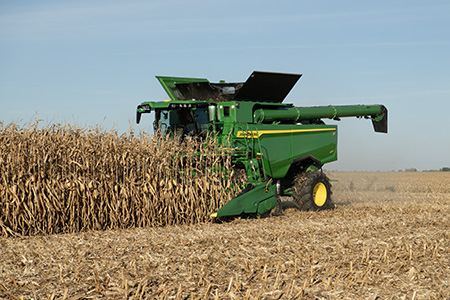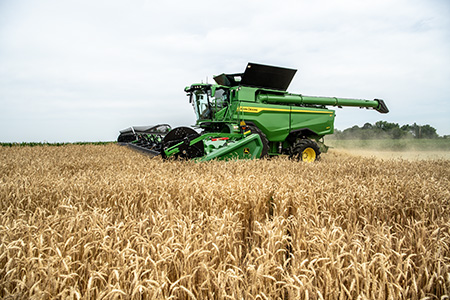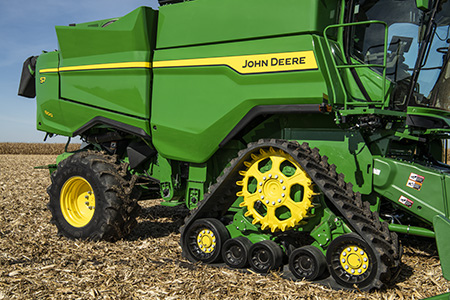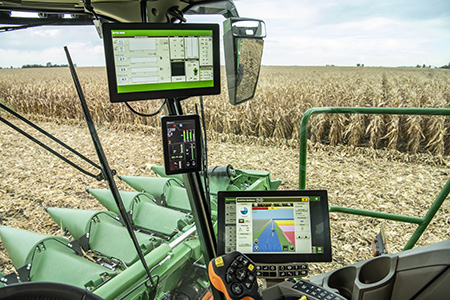-
Menu -
Locations -
Search
John Deere S7 800 Combine

Double tap to zoom

S7 800 Combine
S-Series Combines
Overview:
- All new from top to bottom, with larger1, more comfortable X9 cab
- Integrated G5Plus CommandCenter™ Display, StarFire™ Receiver and JDLink™ modem
- Improved Grain Loss Sensing with 2X1 more sensors for more accurate loss sensing
- Available Predictive Ground Speed and Harvest Settings Automation
- John Deere PowerTech™ 13.6L engine delivering 10% more maximum torque and 10% less fuel usage1
Get A Quote
Fields with asterisks* are required. Please email our helpful staff with any questions or comments using the contact form.
Loan Calculator
Use the Loan Calculator to help you determine the financing and payment options that are best for you.
**The accuracy of this calculator and its applicability to your circumstances is not guaranteed. You should obtain personal advice from qualified professionals. This information is provided for illustrative purposes only and does not constitute an application. This notice does not guarantee loan approval, nor is it an offer or commitment to make a loan to you on the above terms.
Send To A Friend
Fields with asterisks* are required. Your friend will receive an email that contains a reference to this page. Please send this email only to people you know who would be interested in this information.
Share This Product:
Features
High-capacity harvesting in corn and beans
 Harvesting in corn
Harvesting in corn
Designed for performance in coarse grain crops, the TriStream™ rotor and Dyna-Flo™ Plus cleaning shoe efficiently thresh and clean grain in tough harvesting conditions. The TriStream rotor helps maximize fuel efficiency with technology that reduces the force required to move material through the combine by as much as 20 percent. High capacity starts at the feeder house, where the S Series provides large areas of clearance for high volumes of crop to flow uninterrupted.
- TriStream rotor delivers performance – A slightly tapered front nose dramatically reduces the growling that often comes with thick crops and heavy rotor loads. Spiral vanes around the rotor guide the crop material through the feeding and threshing area, reducing hesitation and improving productivity. Meanwhile, rifling grooves on the elements allow the bullet-shaped rotors to move large volumes of crop material through the rotor more efficiently. Rifled elements grip crop material, providing a pulling action that helps even the crop flow, allowing the rotor to deliver better threshing performance.
- Dyna-Flo Plus delivers clean grain – Consider your capacity needs met. In fact, in shoe-limited conditions, you get 10 percent more capacity in corn than previous models, which equates to another 0.6 ha/hr (1.5 acre/hr). The key is uniform distribution and a unique two-stage pre-cleaning design. Four conveyor augers move material onto the shoe steadily and evenly, even on hillsides. A fixed front chaffer helps thin the crop mat; about 30 percent of the air goes to the front chaffer at high speed, allowing it to clean up to 40 percent of the free grain before it reaches the main chaffer. A huge rear chaffer and larger sieve (12 percent larger than previous models) are specially designed to handle the threshing and separating performance of the S7.
Raise your capacity in tough small grains or rice
 Harvesting in wheat
Harvesting in wheat
Truly tough conditions demand more than simple solutions. Rather than slightly improve performance in rice, canola, wheat, barley, oats, or other tough small grains, John Deere S7 Combines set new capacity standards with four crucial components: Active Concave Isolation, a high-performance feeder house, heavy-duty interrupter grates with integrated interrupters, and the variable-stream rotor. When you’re looking at a storm on the radar and you don’t have time to spare, you can run full throttle and still put your toughest crop into the machine without any issues.
- Better material handling – The industry-exclusive variable-stream rotor features a longer, more tapered front cone design that excels in wet, green rice or small grains where the straw is especially tough. The variable-stream rotor with adjustable top cover transport vanes is recommended for rice producers and those facing tough threshing conditions. The vane angle can be adjusted to reduce the stress on straw material as it flows around the rotor, increasing the quality of the straw while using less fuel. Along with the tough material handling capabilities of the variable-stream rotor configuration, the straw quality and length can be improved due to the electrically adjustable top cover transport vanes.
- Dyna-Flo™ Plus cleaning shoe provides more cleaning capacity – In shoe-limited conditions, you’ll see a 14 percent capacity boost in wheat and canola compared to previous John Deere designs, raising your productivity and improving grain quality. Simply put, this is a cleaning system that does it all.
- Harvest through the toughest conditions – Active Concave Isolation (only available on S7 800 and S7 900 Combines) has been improved by applying hydraulic pressure to better secure the concave, providing extra stability when harvesting really tough crops. This increases the machine capacity by 10 percent, so you can harvest outside the optimal harvest windrow or crop conditions when necessary.
- Better feeding in tough conditions – The S7 Combine feeder house design features an exclusive pivoting mid-frame design to provide the highest level of material handling and feeding capacity, especially in high-volume, tough crop conditions. The front feed drum provides you with 5.1 cm (2 in.) of additional movement for greater flexibility in challenging crop.
Spend more time harvesting in tough conditions
The faster you can get to – and into – your fields, the more productive you are. John Deere S7 Series Combines make it easy. Tracks help you get into the field sooner and finish faster. The ProDrive™ system lets you smoothly shift between two speed ranges (field and transport) with the push of a button; you’ll no longer have to stop to shift when going up or down hills or when you’re exiting a field.
- Get your harvest on track – Your ability to get into your fields sooner is easier than ever. Reach a road transport speed of almost 40 km/h (25 mph) with the John Deere tracks. The suspended track system provides a smoother ride with better ground following. This makes for more comfortable harvesting days and lets you finish faster. Available with 76.2- or 91.4-cm (30- or 36-in.) wide belts, these tracks deliver better ride quality and ground following, improved flotation, and less compaction. In addition, there’s no daily maintenance.
 Harvester with tracks
Harvester with tracks
- ProDrive ground drive system – This lets you switch between two infinitely variable speed ranges with the push of a button. Using the CommandARM™ armrest console, you can set the first range for typical harvesting speeds and the second for transport. This reduces your combine’s engine rpms during transport while still maintaining a productive ground speed, improving fuel economy. An electrohydraulic differential lock with a four-pinion differential delivers greater traction in muddy conditions.
 In-cab adjustments with CommandARM console
In-cab adjustments with CommandARM console
- Two-speed, four-wheel drive (4WD) is perfect for demanding conditions – This lets you switch between torque ranges. In slow-speed mode, the high-torque rear assist is ideal for tough conditions. Use high-speed mode for low-torque performance and faster ground speeds.
Specifications
Key Specs
| Engine type | John Deere PowerTech™ 13.6 L 830 cu in. |
|---|---|
| Rated power | 353 kW 473 hp |
| Fuel capacity | 1,250 L 330 gal. |
| Channel width | |
| Threshing cylinder diameter | |
| Rotor length | 312 cm 123 in. |
| Rotor diameter | 76.2 cm 30 in. |
| Concave area | 1.1 m2 11.8 sq ft |
| Separating area | 1.99 m2 21.4 sq ft |
| Total cleaning area (louvered) | 5.9 m2 63.5 sq ft |
| Grain tank size | 14,100 L 400 bu |
| Peak unloading rate | 150 L/s 4.2 bu/sec |
Engine
| Engine type | John Deere PowerTech 13.6 L 830 cu in. |
|---|---|
| Emission level | Final Tier 4 / Tier 2 (Australia/New Zealand) |
| Rated speed | 2,000 rpm |
| Rated power | 353 kW 473 hp |
| Maximum power | 402 kW 540 hp |
| Power boost @ rated speed | 37 kW 50 hp |
| Fuel capacity | 1,250 L 330 gal. |
| Engine family |
Feeding
| Drive type | Fixed or multi-speed |
|---|---|
| Conveyor chain slat type | Cast iron |
| Width | 139.7 cm 55 in. |
| Length | 172.5 cm 67.9 in. |
| Feed Accelerator, Stone Trap (FAST) | Reverser Standard Standard |
Threshing/ Separating
| Separator drum diameter | |
|---|---|
| Separator drum speed | |
| Threshing cylinder speed range | |
| Separator type | Rotary |
| Rotor length | 312 cm 123 in. |
| Rotor diameter | 76.2 cm 30 in. |
| Rotor speed range | High: 400-1,000 rpm Low: 210-530 rpm |
| Concave area | 1.1 m2 11.8 sq ft |
| Separating area | 1.54 m2 16.6 sq ft |
| Discharge grate area | 0.45 m2 4.8 sq ft |
Cleaning
| Front chaffer | 0.5 m2 5.4 sq ft |
|---|---|
| Front chaffer extension | 0.8 m2 8.6 sq ft |
| Pre cleaning | |
| Chaffer | 2.5 m2 26.9 sq ft |
| Sieve area | 2.1 m2 22.6 sq ft |
| Total cleaning area (louvered) | 5.9 m2 63.5 sq ft |
| Cleaning fan speed | 620-1,350 rpm |
Grain handling
| Grain tank size | 14,100 L 400 bu |
|---|---|
| Unloading auger length | 6.9, 7.9 or 8.7 m 22.5, 26 or 28.5 ft |
| Peak unloading rate | 150 L/s 4.2 bu/sec |
Base weight - less head
| Total machine | 22,286 kg 49,141 lb |
|---|
Manufacturing location
| Country | USA, East Moline, Illinois |
|---|
Additional information
| Date collected | 14-November-2023 |
|---|
Contact Us
-
325 Walt Messick Road
Harrington, Delaware 19952
Phone: (302) 398-3729
Toll Free: (800) 237-1272
